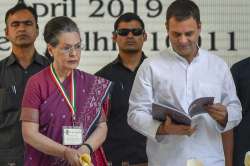Sonia Gandhi unhappy over Congress manifesto layout
Sonia Gandhi was seen talking to Gowda, who also heads the party's research department. She apparently also wanted a bigger image of party's hand symbol as also a brighter layout.

UPA Chairperson Sonia Gandhi was apparently unhappy over the layout of party manifesto released on Tuesday as she wanted a bigger picture of party President Rahul Gandhi on the cover, sources said on Wednesday.
Sonia Gandhi, who did not look her usual self, conveyed her viewpoint to party leader Rajeev Gowda, the convener of the manifesto committee, before she went to the stage to release the manifesto.
Sonia Gandhi was seen talking to Gowda, who also heads the party's research department. She apparently also wanted a bigger image of party's hand symbol as also a brighter layout.
The manifesto -- "Congress will Deliver" -- carries a large picture of a big gathering of people. At the bottom, it has a small picture of smiling Rahul Gandhi along with the party's hand symbol. There is also big picture of the party President sitting among rural women on Page 9 of the manifesto.
The slogan "Congress will deliver" is written in large font size, while the words "Manifesto - Lok Sabha elections 2019 Indian National Congress" are in smaller fonts at the bottom.
Sonia Gandhi did not take any questions at the manifesto launch event on Tuesday and was seen intermittently talking to Rahul Gandhi sitting next to her. Rahul Gandhi had suggested that party spokesperson Randeep Singh Surjewala let the media ask questions to other senior leaders on the stage.
Sonia Gandhi also did not deliver a speech like some other leaders present on the stage, including former Prime Minister Manmohan Singh, former Finance Minister P. Chidambaram and Gowda.
Surjewala, however, said that the reports of Sonia Gandhi being upset were not correct. "It is not correct," he said.
Chidambaram headed the manifesto committee.
The release of manifesto was a big occasion for the Congress as it sought to seize the political narrative for 2019 elections with its thrust on social and economic issues, including minimum income support of Rs 72,000 per annum to the poorest 20 per cent people, job creation, GST simplification and enhanced outlays for health and education.